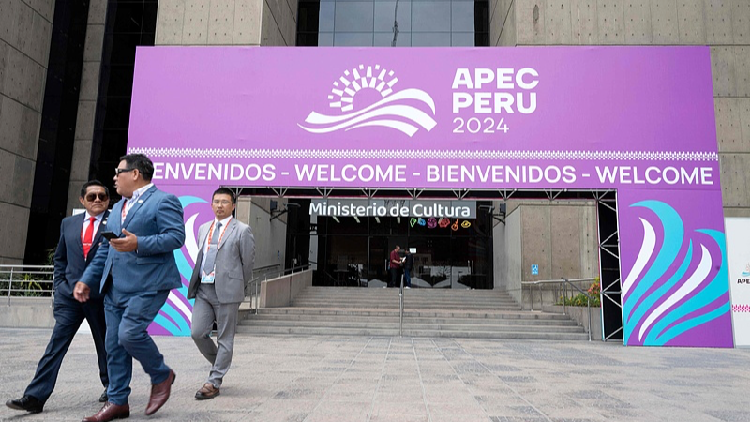APEC, energy transition, protectionism


Editor’s note: Peter TC Chang is a research associate at the Malaysia-China Friendship Association. The article reflects the author’s opinions and not necessarily the views of CGTN.
<img src='https://news.cgtn.com/news/2024-11-14/APEC-energy-transition-protectionism-1ywqYBY2kAE/img/4ebeeee615f04f21a758528189cb9f7b/4ebeeee615f04f21a758528189cb9f7b.png' alt='Local time on November 11, 2024, Lima, Peru, Lima Convention Center entrance. /CFP'
In October, Spain experienced devastating floods, while earlier this year, the US was struck by two powerful hurricanes. These extreme weather events are stark reminders that global climate change is real, and time is running out to take meaningful actions before its effects become irreversible.
This week, leaders from the Asia-Pacific region are convening in Lima, Peru, for the APEC Leaders’ Meeting, where among many other objectives, energy transition is a central focus. The meeting aims to promote sustainable and equitable energy shifts, with member economies working to accelerate clean energy adoption and ensure affordable, accessible solutions, especially for developing members.
Earlier, in August, Malaysia participated in the 14th APEC Energy Ministers’ Meeting in Lima, Peru, where Deputy Prime Minister Fadillah Yusof highlighted Malaysia’s National Energy Transition Roadmap (NETR), outlining the country’s strategy to achieve net-zero greenhouse gas emissions by 2050.
<img src='https://news.cgtn.com/news/2024-11-14/APEC-energy-transition-protectionism-1ywqYBY2kAE/img/d8eb688cb34a47faabfe4de7ed269bb3/d8eb688cb34a47faabfe4de7ed269bb3.jpeg' alt='On November 12, local time, in Lima, Peru, staff members talk in the APEC 2024 International Media Center. /CFP'
In June, Premier Li Qiang visited Malaysia to commemorate the 50th anniversary of diplomatic relations between the two countries. During the visit, both nations renewed a five-year trade and economic cooperation agreement. This pact includes collaborations in emerging fields such as green development, the digital economy, and artificial intelligence, all of which are crucial for advancing Malaysia’s energy transition.
Over the past decade, China has emerged as a global leader in green technology, becoming the world’s largest producer of solar panels, wind turbines, and batteries. This is significant for two main reasons. First, advancements in these technologies are allowing us to take substantial steps toward mitigating the impact of climate change. Second, China’s large-scale production capacity is making green technologies more affordable and accessible, enabling many countries – especially in the developing world – to embark on their own transitions to cleaner energy and greener economies.
However, geopolitical tensions, particularly the deterioration of US-China relationship, are impeding global efforts to combat climate change. President Biden has pledged to compete with China where necessary and cooperate where possible, with climate change identified as a critical area for collaboration. In September, US climate envoy John Podesta visited China, and both nations reaffirmed their earlier commitments to achieve “practical cooperation results” on climate issues.
Despite these pledges, competition remains a defining aspect of the relationship between the two countries. For example, the ongoing trade conflicts, including US tariffs on Chinese solar panels, wind turbines, and electric vehicles, risks undermining not only American progress but also the broader global green transition.
Biden is attending the APEC Leaders’ Meeting, but the significance of his presence is overshadowed by the recent re-election of Trump as the next US President. During his first term, Trump withdrew the US from the Paris Accord, and there is growing concerns that he may take similar actions again, a move that could severely undermine global efforts to address climate change.
Climate change is a reality, and for the first time, in the developing world, we have the technological means to make substantial strides toward cleaner energy and a greener economy. However, unless the developed world can rise above protectionism and nationalism, our efforts to mitigate the impacts of climate change will ultimately prove futile.

